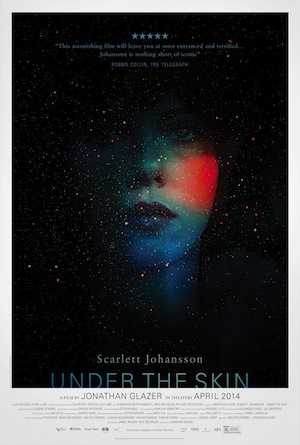 This review appears originally on Lawrence.com. TV review from KCTV5 It’s Your Morning.
This review appears originally on Lawrence.com. TV review from KCTV5 It’s Your Morning.
Filled with all kinds of opposing tendencies, Under the Skin is a movie that is by turns grimy and beautiful, confusing and enlightening, and vague yet specific. It’s been weeks since I’ve seen the film and I haven’t shaken it yet.
Under the Skin revels in the limited amount of information it gives you. Director Jonathan Glazer co-wrote the screenplay with Walter Campbell and the prevailing strategy is alienation. Despite the fact that it’s based on a book by Michel Faber, all the details seem to be left out, or at least open for interpretation.
Scarlett Johansson plays Laura, a being that comes to life following the death of a young Scottish woman. Glazer opens the film with a “birth” sequence that could have been ported straight in from Stanley Kubrick’s 2001: A Space Odyssey. Punctuated with the harsh, squeaky tones of Mica Levi’s sometimes painful score and dialogue snippets of Laura testing out her voice, it’s completely disorienting and serves to put the audience in the same position as Johansson’s character, viewing this new world for the first time.
One scene that takes place on a beach is viewed with an unthinkable amount of dispassion for the human condition.
At its core, Under the Skin is an exploration of how a complete stranger to humankind might view us. Laura drives through the Scottish countryside into the gritty environs of working-class neighborhoods, trolling for men to lure into her van. Glazer’s camera often takes on her perspective, and the use of so many non-actors gives the film an authentic, docudrama feel — which is completely at odds with what happens next.
Once “she” finds a willing victim, the film gets vague again. We see what happens, but where exactly do they go and what exactly is happening? Glazer has designed a nightmare sequence that only gets more haunting and mysterious with return visits. Seeing the fate of Laura’s victims works both as a terrifying mounting terror and an allegory for our own physical alienation from our own bodies.
It isn’t too often that I can say I’ve seen something in a movie that I’ve never seen before.
Under the Skin is aptly named. It feels otherworldly, as it burrows itself into your subconscious. The languid pace gives plenty of time to digest the images and their meaning. On one level, the film explores the banality of base human desires, and the difference between simply being sentient and actually becoming sympathetic. As a movie-going experience, it is thrillingly alive, hearkening back to the heyday of ’70s art cinema.










Comments on this entry are closed.